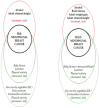Nutrition and Breast Cancer: A Literature Review on Prevention, Treatment and Recurrence
- PMID: 31277273
- PMCID: PMC6682953
- DOI: 10.3390/nu11071514
Nutrition and Breast Cancer: A Literature Review on Prevention, Treatment and Recurrence
Abstract
Breast cancer (BC) is the second most common cancer worldwide and the most commonly occurring malignancy in women. There is growing evidence that lifestyle factors, including diet, body weight and physical activity, may be associated with higher BC risk. However, the effect of dietary factors on BC recurrence and mortality is not clearly understood. Here, we provide an overview of the current evidence obtained from the PubMed databases in the last decade, assessing dietary patterns, as well as the consumption of specific food-stuffs/food-nutrients, in relation to BC incidence, recurrence and survival. Data from the published literature suggest that a healthy dietary pattern characterized by high intake of unrefined cereals, vegetables, fruit, nuts and olive oil, and a moderate/low consumption of saturated fatty acids and red meat, might improve overall survival after diagnosis of BC. BC patients undergoing chemotherapy and/or radiotherapy experience a variety of symptoms that worsen patient quality of life. Studies investigating nutritional interventions during BC treatment have shown that nutritional counselling and supplementation with some dietary constituents, such as EPA and/or DHA, might be useful in limiting drug-induced side effects, as well as in enhancing therapeutic efficacy. Therefore, nutritional intervention in BC patients may be considered an integral part of the multimodal therapeutic approach. However, further research utilizing dietary interventions in large clinical trials is required to definitively establish effective interventions in these patients, to improve long-term survival and quality of life.
Keywords: breast cancer; diet; food; nutrients; prevention.
Conflict of interest statement
The authors declare no conflict of interest.
Figures


Similar articles
-
Associations of Mediterranean Diet and a Posteriori Derived Dietary Patterns with Breast and Lung Cancer Risk: A Case-Control Study.Nutrients. 2018 Apr 11;10(4):470. doi: 10.3390/nu10040470. Nutrients. 2018. PMID: 29641468 Free PMC article.
-
Nutrition and primary prevention of breast cancer: foods, nutrients and breast cancer risk.Eur J Obstet Gynecol Reprod Biol. 2005 Dec 1;123(2):139-49. doi: 10.1016/j.ejogrb.2005.05.011. Eur J Obstet Gynecol Reprod Biol. 2005. PMID: 16316809 Review.
-
Whole Grain Consumption for the Prevention and Treatment of Breast Cancer.Nutrients. 2019 Aug 1;11(8):1769. doi: 10.3390/nu11081769. Nutrients. 2019. PMID: 31374888 Free PMC article. Review.
-
The role of nutrition in the prevention of breast cancer.AACN Clin Issues. 2004 Jan-Mar;15(1):119-35. doi: 10.1097/00044067-200401000-00011. AACN Clin Issues. 2004. PMID: 14767370 Review.
-
Nutrition and physical activity influence on breast cancer incidence and outcome.Breast. 2013 Aug;22 Suppl 2:S30-7. doi: 10.1016/j.breast.2013.07.006. Breast. 2013. PMID: 24074789 Review.
Cited by
-
The Cancer Incidence and Trends From 2011 to 2018 in Ma'anshan, China: A Registry-Based Observational Study.Cancer Control. 2024 Jan-Dec;31:10732748241284537. doi: 10.1177/10732748241284537. Cancer Control. 2024. PMID: 39303296 Free PMC article.
-
Breast Cancer Survivors Undergoing Endocrine Therapy Have a Worrying Risk Factor Profile for Cardiovascular Diseases.Nutrients. 2021 Mar 29;13(4):1114. doi: 10.3390/nu13041114. Nutrients. 2021. PMID: 33805280 Free PMC article.
-
Effect of a lifestyle intervention program's on breast cancer survivors' cardiometabolic health: Two-year follow-up.Heliyon. 2023 Oct 29;9(11):e21761. doi: 10.1016/j.heliyon.2023.e21761. eCollection 2023 Nov. Heliyon. 2023. PMID: 38027927 Free PMC article.
-
An Integrated Care Approach to Improve Well-Being in Breast Cancer Patients.Curr Oncol Rep. 2024 Apr;26(4):346-358. doi: 10.1007/s11912-024-01500-1. Epub 2024 Feb 24. Curr Oncol Rep. 2024. PMID: 38400984 Free PMC article. Review.
-
Comparison of the Index of Nutritional Quality in Breast Cancer Patients With Healthy Women.Front Nutr. 2022 Mar 24;9:811827. doi: 10.3389/fnut.2022.811827. eCollection 2022. Front Nutr. 2022. PMID: 35399658 Free PMC article.
References
-
- Ferlay J., Hery C., Autier P., Sankaranarayanan R. Breast Cancer Epidemiology. Springer; New York, NY, USA: 2010. Global Burden of Breast Cancer; pp. 1–19.
-
- Seward B.W., Wild C.P. International Agency for Research on Cancer. World Cancer Report 2014. Lyon International Agency for Research on Cancer; Lyon, France: 2014. pp. 16–69.
-
- Cancer Statistics Center. [(accessed on 27 September 2018)]; Available online: https://cancerstatisticscenter.cancer.org/#!/cancer-site/Breast.
-
- Global Cancer Observatory. [(accessed on 27 September 2018)]; Available online: http://gco.iarc.fr.
Publication types
MeSH terms
LinkOut - more resources
Full Text Sources
Medical
Research Materials

